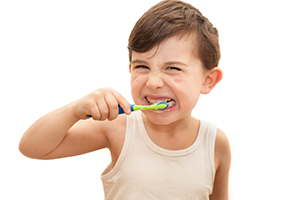 You know those tiny beads in your toothpaste? Well, those microbeads in toothpaste are actually made of plastic and they’re wreaking havoc on not only the environment, but in our patients’ mouths!
You know those tiny beads in your toothpaste? Well, those microbeads in toothpaste are actually made of plastic and they’re wreaking havoc on not only the environment, but in our patients’ mouths!
What are the Microbeads in Toothpaste Made Of?
Polyethylene, the material that makes up these beads, is not water soluble. In fact, it can take 5-10 years for it to decompose! When washed down the drain, these beads collect in the sewage system and pollute the surrounding water ways. But what may be even worse, though, is that these plastic microbeads in toothpaste are getting stuck in the gums of our patients!
Dangers of Microbeads in Toothpaste
Quite often, we have patients come into our office for a regular cleaning and our hygienists discover that the plastic microbeads in patients’ toothpaste are getting lodged between their teeth and gums. There is not proof, yet, that these microbeads cause significant damage, however it’s never good to have such an unnatural product embedded into the gums. And the real kicker is that these beads don’t provide any dental benefit, they’re for aesthetic purposes only!
Brushing with Microbeads in Toothpaste
Here’s what’s really going on when you brush your teeth with a microbead-containing toothpaste.
The gums surrounding each tooth have a channel called a sulcus, a band of tissue that acts as a cuticle around the tooth. When you go to the dentist for a cleaning, one of the hygienist’s main goals is to clean each sulcus to prevent gum disease and tooth decay. The sulcus is tight around the tooth, however it’s not impenetrable. Think of all those times you’ve gotten a piece of popcorn stuck in your gums – it’s actually lodged into your sulcus. When you brush your teeth with a microbead-containing toothpaste, you are manually pushing hundreds, maybe thousands of these plastic beads into your sulcus. Not all beads get stuck, but when they do, it can definitely be a pain to remove them.
Are there Microbeads in YOUR Toothpaste?
Fortunately, Proctor & Gamble, maker of Crest toothpaste, has pledged to remove all plastic microbeads from its products by 2017. But, in the meantime take caution when selecting a toothpaste. Check the box for any ingredients including polyethylene or polypropylene. Trish Walraven RDH, BSDH created a helpful list of Crest products that contain these pesky and potentially dangerous plastic microbeads.
Dental Services in Parma Heights, Ohio
If you’re concerned about the plastic mircrobeads in toothpaste getting lodged into your gums, contact Dr. Wolnik’s office today. Our expert hygienists will clean the beads from your gums and help you select a toothpaste that doesn’t contain plastic. Contact us at:
Phone: (440) 888-5055
Email: [email protected]
Kenneth J. Wolnik, DDS Website
Connect on Social!






